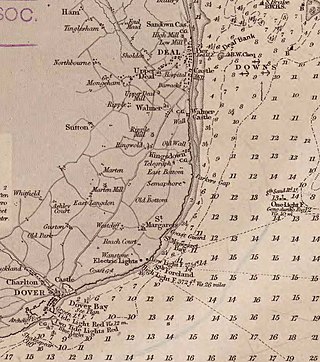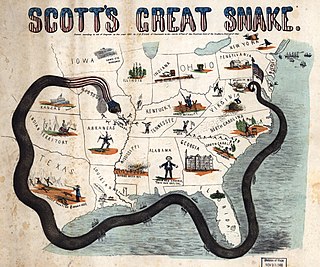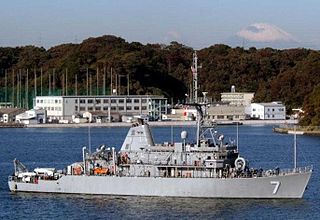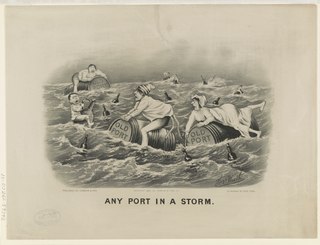
SOS is a Morse code distress signal, used internationally, originally established for maritime use. In formal notation SOS is written with an overscore line, to indicate that the Morse code equivalents for the individual letters of "SOS" are transmitted as an unbroken sequence of three dots / three dashes / three dots, with no spaces between the letters. In International Morse Code three dots form the letter "S" and three dashes make the letter "O", so "S O S" became a common way to remember the order of the dots and dashes. IWB, VZE, 3B, and V7 form equivalent sequences, but traditionally SOS is the easiest to remember.)

The Downs is a roadstead in the southern North Sea near the English Channel off the east Kent coast, between the North and the South Foreland in southern England. During the month of August, 1511, Andrew Barton (privateer) was executed under wishes of Henry VIII as a result of his (Andrew's) interference with English cargoes. In 1639 the Battle of the Downs took place here, when the Dutch navy destroyed a Spanish fleet which had sought refuge in neutral English waters. From the Elizabethan era onwards, the presence of the Downs helped to make Deal one of the premier ports in England, and in the 19th century, it was equipped with its own telegraph and timeball tower to enable ships to set their marine chronometers.

A blockade is the act of actively preventing a country or region from receiving or sending out food, supplies, weapons, or communications, and sometimes people, by military force. A blockade differs from an embargo or sanction, which are legal barriers to trade rather than physical barriers. It is also distinct from a siege in that a blockade is usually directed at an entire country or region, rather than a fortress or city and the objective may not always be to conquer the area.
A distress signal, also known as a distress call, is an internationally recognized means for obtaining help. Distress signals are communicated by transmitting radio signals, displaying a visually observable item or illumination, or making a sound audible from a distance.
From early in the 20th century, the radio frequency of 500 kilohertz (500 kHz) was an international calling and distress frequency for Morse code maritime communication. For much of its early history, this frequency was referred to by its equivalent wavelength, 600 meters, or, using the earlier frequency unit name, 500 kilocycles or 500 kc.
The International Convention for the Safety of Life at Sea (SOLAS) is an international maritime treaty that sets minimum safety standards in the construction, equipment and operation of merchant ships. The International Maritime Organization convention requires signatory flag states to ensure that ships flagged by them comply with at least these standards.

USS Patriot (MCM-7), is an Avenger-class mine countermeasures ship of the United States Navy, and is the third Navy ship of that name. The hulls of the Avenger-class ships are constructed of wood with an external coat of fiberglass.

A chief mate (C/M) or chief officer, usually also synonymous with the first mate or first officer, is a licensed mariner and head of the deck department of a merchant ship. The chief mate is customarily a watchstander and is in charge of the ship's cargo and deck crew. The actual title used will vary by ship's employment, by type of ship, by nationality, and by trade: for instance, chief mate is not usually used in the Commonwealth, although chief officer and first mate are; on passenger ships, the first officer may be a separate position from that of the chief officer that is junior to the latter.
A second mate or second officer (2/O) is a licensed member of the deck department of a merchant ship holding a Second Mates Certificate of Competency, which is issued by the administration. The second mate is the third in command and a watchkeeping officer, customarily the ship's navigator. Other duties vary, but the second mate is often the medical officer and in charge of maintaining distress signaling equipment. On oil tankers, the second mate usually assists the chief mate with the cargo operations.

A third mate (3/M) or third officer is a licensed member of the deck department of a merchant ship. The third mate is a watchstander and customarily the ship's safety officer and fourth-in-command. The position is junior to a second mate. Other duties vary depending on the type of ship, its crewing, and other factors.
Maritime security is an umbrella term informed to classify issues in the maritime domain that are often related to national security, marine environment, economic development, and human security. This includes the world's oceans but also regional seas, territorial waters, rivers and ports, where seas act as a “stage for geopolitical power projection, interstate warfare or militarized disputes, as a source of specific threats such as piracy, or as a connector between states that enables various phenomena from colonialism to globalization”. The theoretical concept of maritime security has evolved from a narrow perspective of national naval power projection towards a buzzword that incorporates many interconnected sub-fields. The definition of the term maritime security varies and while no internationally agreed definition exists, the term has often been used to describe both existing, and new regional and international challenges to the maritime domain. The buzzword character enables international actors to discuss these new challenges without the need to define every potentially contested aspect of it. Maritime security is of increasing concern to the global shipping industry, where there are a wide range of security threats and challenges. Some of the practical issues clustered under the term of maritime security include crimes such as piracy, armed robbery at sea, trafficking of people and illicit goods, illegal fishing or marine pollution. War, warlike activity, maritime terrorism and interstate rivalry are also maritime security concerns.

The Rouse Simmons was a three-masted schooner famous for having sunk in a violent storm on Lake Michigan in 1912. The ship was bound for Chicago with a cargo of Christmas trees when it foundered off Two Rivers, Wisconsin, killing all on board.

Piracy in the Gulf of Guinea affects a number of countries in West Africa as well as the wider international community. By 2011, it had become an issue of global concern. Pirates in the Gulf of Guinea are often part of heavily armed criminal enterprises, who employ violent methods to steal oil cargo. In 2012, the International Maritime Bureau, Oceans Beyond Piracy and the Maritime Piracy Humanitarian Response Program reported that the number of vessels attacks by West African pirates had reached a world high, with 966 seafarers attacked during the year. According to the Control Risks Group, pirate attacks in the Gulf of Guinea had by mid-November 2013 maintained a steady level of around 100 attempted hijackings in the year, a close second behind the Strait of Malacca in Southeast Asia. Piracy in the Gulf of Guinea continues to be a concern to the shipping industry, which is affected significantly. At the same time, governments in the region generally highlight that the fight against piracy requires a broad understanding of maritime security throughout the Gulf of Guinea.
A Maritime Exclusion Zone (MEZ) is a military exclusion zone at sea. While it is an accepted concept internationally, it is not the subject of an explicit treaty, and there has been variation in naming including: "naval exclusion zone", "maritime security zone", "blockade zone", "maritime operational zone", "area subject to long distance blockade" and "area dangerous to shipping".
The Erika legislative packages of the European Union are maritime laws intended to improve safety in the shipping industry and thereby reduce environmental damage to the oceans.

MS Spirit of Britain is a cross-channel ferry operated by P&O Ferries on the Dover-Calais route. She is the first of two 'Spirit' class ships built for P&O Ferries, the other being Spirit of France. The vessels are the largest ferries constructed for the cross-channel route.
Adriatica was a bulk carrier that sank in the Mediterranean Sea on December 12, 2010.

Hougomont was the name of a four-masted steel barque built in Greenock, Scotland in 1897 by Scotts Shipbuilding & Engineering Co. In 1924 she was purchased by Gustav Erikson's shipping company in Mariehamn, Åland, Finland. She was used for transport and schooling ship for young sailors until 1932 when a squall completely broke her rig on the Southern Ocean and she was sunk as breakwater near the town of Stenhouse Bay in South Australia. ' Hougomont had a crew of 24 men. The name "Hougomont" is derived from Château d'Hougoumont where the Battle of Waterloo was fought. While seaworthy she sailed to Peru, Florida, Canada, Australia, England, Ireland, and Sweden among other destinations. She had two sister ships, Nivelle and Archibald Russell.

SS Luxembourg Victory was a Victory ship built for the United States during World War II. She was launched by the Oregon Shipbuilding Corporation on February 28, 1944, and was completed on April 5, 1944. The ship's US Maritime Commission designation was VC2-S-AP3, hull number 90 (V-90). She was built in 101 days under the Emergency Shipbuilding program. The Maritime Commission turned her over to a civilian contractor, the Lykes Brothers SS Company, for operation until the end of World War II hostilities. She was operated under the US Merchant Marine Act for the War Shipping Administration.

Any port in a storm is a proverb that loosely means that when someone is in trouble they cannot wait for the perfect solution. The phrase has been used in popular culture and politics since at least 1749. The original meaning of this nautical phrase was that a ship at sea in rough weather had no choice of harbor for shelter.











